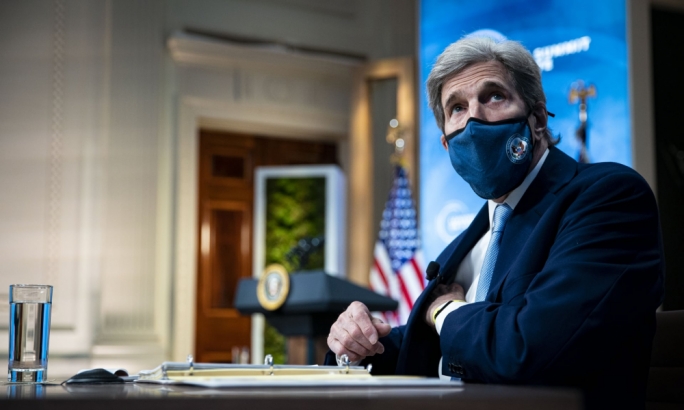Climate change is perhaps the greatest threat we face in the 21st century and we must face this existential challenge with urgency and with commitment
Special Presidential Envoy for Climate John Kerry promised “the United States will partner with nations to solve the climate crisis”
s we celebrate the 51st anniversary of Earth Day, I reflect on the palpable lesson Mother Earth has imparted to us during the COVID-19 pandemic: nature does not need human beings, but human beings undoubtedly need nature – its clean air, clean water, and healthy foods – to survive. Yet, at the same time, we also need good jobs and a solid economy to flourish, particularly as we begin to recover from the economic impacts of COVID. As we face this paradox, it has never been more important for us to find the right balance between economic growth and environmental stewardship – ensuring the sustainable longevity of our Mother Earth and our humanity.
Right now back in Washington D.C., the U.S. government is laser-focused on limiting or eliminating the ravages of climate change by encouraging sustainable business practices. Across the United States, governments and businesses alike have committed to creating good-paying jobs and an equitable clean energy future, while building modern and sustainable infrastructure, restoring scientific integrity, and implementing evidence-based policymaking.
In places like my home state of Texas, sustainable practices that benefit both the environment and the economy are becoming the cornerstone of business development. Texas, like Malta, is blessed with sunshine and is the fifth-largest producer of solar power in the United States. However, Texas’ most effective sustainable practice is wind energy, with Texas leading the nation in wind-generated power with more than 30 percent of U.S. electricity coming from wind. The Texas Sustainable Energy Research Institute partners with the community to research and contribute to a “new energy future,” focused on carbon capture and reutilisation, energy conservation, and solar panel integration. These initiatives, and others like them, are examples of how that delicate balance between economic and sustainable development can be achieved. They are environmentally responsible and create jobs in green infrastructure, while also significantly reduce energy bills for businesses and citizens. That’s a win-win situation.
On the international front, Special Presidential Envoy for Climate John Kerry promised “the United States will partner with nations to solve the climate crisis” and pass on the Earth in better shape for future generations. To do so, we must partner with countries around the world to limit the planet’s global warming to 1.5 degrees Celsius.
The United States is already working with international organisations, civil society, and governments to support policies and programmes that conserve and restore forests; promote sustainable agriculture and fisheries; stop illegal logging, mining, and fishing; and combat wildlife trafficking and marine plastic pollution. These policies and programmes help preserve our planet’s natural beauty and provide economic benefits for our children and future generations. More and more American students are earning degrees in environmental science because they are interested in improving the environment and attracted to the jobs in the green-tech sector in the United States.
Here in Malta, we support efforts to green Malta’s economy. Together with the Ministry for Energy, Enterprise, and Sustainable Development, we recently organised a programme that addressed emerging energy technologies and intelligent solutions that will reduce Malta’s dependency on fossil fuels and promote clean energy alternatives, significantly lower greenhouse gas emissions, and maximise the use of indigenous resources. Malta’s renewable energy strategy will create jobs in sectors such as research, solar and wind farm technologies, and waste-to-energy installations.
Our work to promote sustainable practices in Malta is a priority and something we embrace every day at the U.S. Embassy. My colleagues and I are proud that our own embassy is a LEED Silver certified “green” building. It incorporates the latest strategies for sustainable site development, water conservation, energy savings, materials selection, and indoor environmental quality to combine environmentally-sound practices with economic efficiency. In this way, our greening initiatives compliment Malta’s commitment to a sustainable economic model.
On Earth Day, we also celebrate the 26th birthday of the Global Learning and Observation to Benefit the Environment (GLOBE) and our fourteen-year partnership with the Ministry of Education and the University of Malta’s Center for Environmental Education and Research in the GLOBE Malta programme. GLOBE is a worldwide international science programme that prepares students for careers in Science, Technology, Engineering and Mathematics (STEM) fields, which are a major source of modern, sustainable economic growth. GLOBE repeatedly recognised Maltese and Gozitan students as top contributors of quality scientific data and analysis. Just recently, GLOBE selected a student from Gozo to be one of 12 international GLOBE student vloggers – congratulations Hannah Vella! Hannah will join other GLOBE Student Vloggers to document their initiatives to safeguard the environment and raise awareness among their peers.
During the 2021 Malta Sustainability Forum, President George Vella praised businesses that are embracing Corporate Social Responsibility that focuses on sustainability. The U.S. Embassy recognised a number of U.S. firms in Malta for leading the way on sustainability programmes and for improving the environment of their workers, their customers, and communities. Among them is Baxter, which received the U.S. Ambassador’s Award for Environmental Excellence in recognition of its initiatives to reduce its carbon footprint.
Climate change is perhaps the greatest threat we face in the 21st century and we must face this existential challenge with urgency and with commitment. Our governments must foster local economies that are viable, innovative, and embrace technologies and practices that encourage sustainability. And we can’t wait any longer. Together we must restore our earth.
Article Credit: maltatoday
